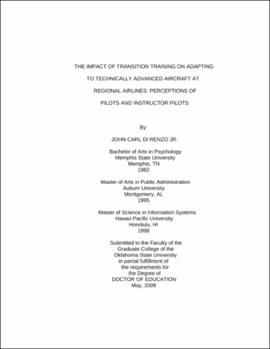| dc.contributor.advisor | Bliss, Timm J. | |
| dc.contributor.author | Di Renzo, John Carl, Jr. | |
| dc.date.accessioned | 2013-11-26T08:32:15Z | |
| dc.date.available | 2013-11-26T08:32:15Z | |
| dc.date.issued | 2009-05 | |
| dc.identifier.uri | https://hdl.handle.net/11244/7181 | |
| dc.description.abstract | Scope and Method of Study: The purpose of this study was to test a hypothesis about pilot and instructor pilot perceptions of how effectively pilots learn and use new technology, found in Technically Advanced Aircraft (TAA), given initial type of instrumentation training. New aviation technologies such as Glass Cockpits in technically advanced aircraft are complex and can be difficult to learn and use. The research questions focused on the type of initial instrumentation training to determine the differences among pilots trained using various types of instrumentation ranging from aircraft equipped with traditional analog instrumentation to aircraft equipped with glass cockpits. A convenience sample of Pilots in Training (PT) and Instructor Pilots (IP) was selected from a regional airline. The research design used a mixed methodology. Pilots in training completed a thirty-two question quantitative questionnaire and instructor pilots completed a five question qualitative questionnaire. | |
| dc.description.abstract | Findings and Conclusions: This investigation failed to disprove the null hypothesis. The type of instrumentation training has no significant effect on newly trained regional airline pilot perceived ability to adapt to advanced technology cockpits. Therefore, no evidence exists from this investigation to support the early introduction and training of TAA. While the results of this investigation were surprising, they are nonetheless, instructive. Even though it would seem that there would be a relationship between exposure to and use of technically advanced instrumentation, apparently there was no perceived relationship for this group of airline transport pilots. However, a point of interest is that these pilots were almost evenly divided in their opinion of whether or not their previous training had prepared them for transition to TAA. The majority also believed that the type of initial instrumentation training received does make a difference when transitioning to TAA. Pilots believed that TAA made them safer pilots, but were not convinced it made them better pilots. The results of this investigation raise many new questions and provide a number of ideas for future research projects. | |
| dc.format | application/pdf | |
| dc.language | en_US | |
| dc.rights | Copyright is held by the author who has granted the Oklahoma State University Library the non-exclusive right to share this material in its institutional repository. Contact Digital Library Services at lib-dls@okstate.edu or 405-744-9161 for the permission policy on the use, reproduction or distribution of this material. | |
| dc.title | Impact of transition training on adapting to technically advanced aircraft at regional airlines: Perceptions of pilots and instructor pilots | |
| dc.contributor.committeeMember | Hansen, Frederick D. | |
| dc.contributor.committeeMember | Kutz, Mary | |
| dc.contributor.committeeMember | Brown, Anthony E. | |
| osu.filename | DiRenzo_okstate_0664D_10233.pdf | |
| osu.accesstype | Open Access | |
| dc.type.genre | Dissertation | |
| dc.type.material | Text | |
| dc.subject.keywords | advanced | |
| dc.subject.keywords | aircraft | |
| dc.subject.keywords | technically | |
| dc.subject.keywords | training | |
| dc.subject.keywords | transition | |
| thesis.degree.discipline | Applied Educational Studies | |
| thesis.degree.grantor | Oklahoma State University | |
